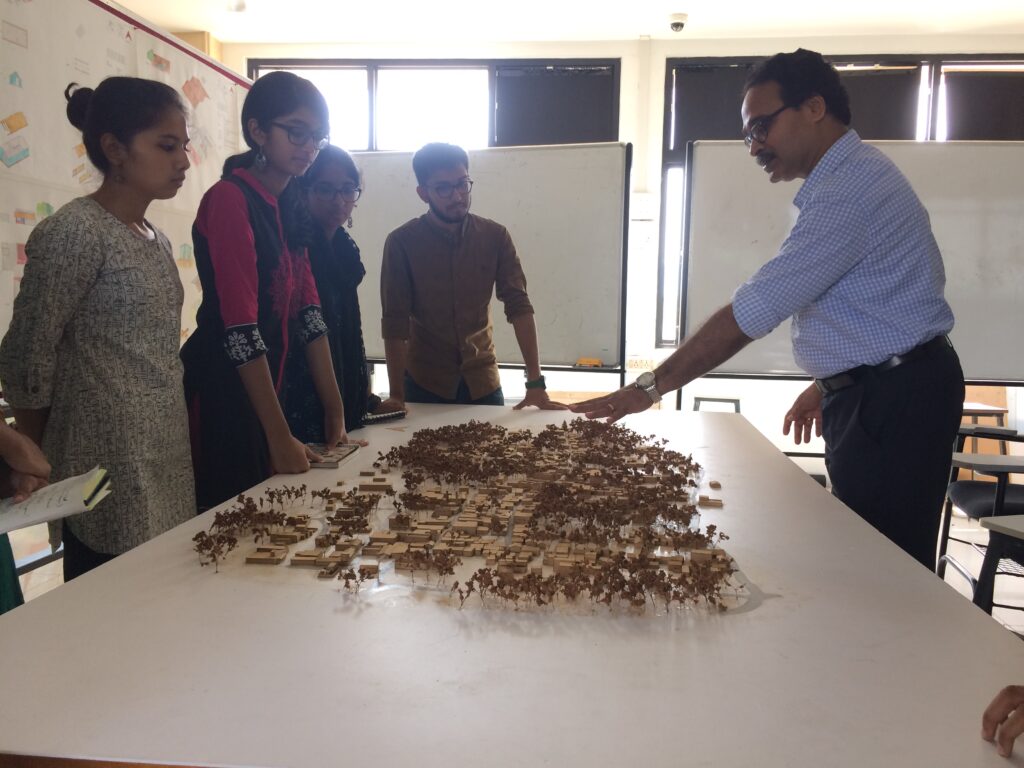School of Architecture (V-SPARC) - UG
SCHOOL OF ARCHITECTURE (V-SPARC)
The V-SPARC School of Architecture offers an accredited Bachelor’s degree program in Architecture, approved by the Council of Architecture (CoA), New Delhi, in accordance with the Architects Act of 1972. Candidate selection for this program is based on the marks obtained in the National Aptitude Test in Architecture (NATA), as determined by CoA and VIT’s specific criteria.
Our program is meticulously designed to foster the progressive development of students’ theoretical knowledge in Architectural Design while equipping them with the skills to tackle real-world challenges at local, national, regional, and global levels. This unique approach is rooted in the Curriculum Applied Learning (CAL) methodology, comprising Program Core courses that are mandatory for all students, and a diverse array of course-specific electives available throughout the semesters. This interdisciplinary learning not only enhances the educational experience but also sets our program apart, ensuring that our students are well-prepared to thrive in the field of architecture.
Programme Features:
- A curriculum primed for industry readiness.
- Encouragement of interdisciplinary learning.
- Practical, hands-on workshops for experiential education.
- Engagement with industry experts.
- Incorporating travel-based learning into the curriculum.
- Facilitating international exchanges for both students and faculty.
- Participation in international joint studio programs.
- Promoting undergraduate research and publication.
- Offering internship and placement guidance

- Studio Works
- Travel Learning
- Visiting Faculty
Architectural Design I: Foundation Design Studio
Architectural Design II: Spatial Exploration
Architectural Design III: Rural Environment Studies
Architectural Design IV: Midscale Urban Built Forms
Architectural Design V: Civic Design
Architectural Design VI: Technical Drawings
Architectural Design VII: Complex Typologies
Architectural Design VIII: Urban Design
Architectural Thesis
- Site visits: Videos/Photos
- Study Tours: National and International (Videos/Photos)
- Mr. Nirmal Sylvester J., Principal Architect, Urban Design Collaborative
- Ms. Ranjeeta Giftson, Chief Architect, Kingsway Consultants
- Mr. C. J. Kosalraman, Principal Architect, Infrabees Project Management Consultants Pvt Ltd
- Mr. S. CHANDAR, Senior Partner, CS Designs Pvt Ltd
- Mr. Asaithambi G., Senior Architect, Guru Design Studio, Pondicherry
- B.Arch.
- About the Programme
- Programme Core Courses
- Programme Elective Courses
- Infrastructure
- Scope of employment
- Curriculum
V-SPARC School of Architecture offers a Bachelor degree program in Architecture approved by the Council of Architecture (CoA), New Delhi under the purview of the Architects Act of 1972. The selection of eligible candidates for the program is based on the marks obtained at the National Aptitude Test in Architecture (NATA) by the CoA and VIT set criteria.
The program is designed in such a way that the students would progressively develop their theoretical knowledge in Architectural Design as well as equip themselves to solve real world problems at local, national, regional and global scenarios.
The program is offered on a Fully Flexible Credit System (FFCS) where, there are Program Core courses which are mandatory for all students and a basket of course-specific electives that are available across semesters as a part of interdisciplinary learning which is unique to the program.
- Basic Design and Workshop
- Basic Architectural Graphics
- Professional Practice
- Principles of Structures
- Building Services - Plumbing & Sanitary
- Environmental Studies - Site Planning, Landscape & climatology
- Strength of Materials
- Construction Technology - Raw & Processed Natural Materials
- Architectural Design - Spatial Understanding
- History & Theory of Architecture –Contemporary
- Architectural Design - Rural Study
- Construction Technology -Concrete & Steel
- Architectural Internship
- Architectural Design - Community
- Architectural Design – Complex Typologies
- Architectural Design - Digital Design
- Architectural Thesis
- Architectural Design – Institutions
- Architectural Design - Urban Transformation
- History & Theory of Architecture - Ancient
- Art Forms Appreciation
- Ideation
- Visual Arts - Basic Skill Development
- Study Tour 1
- Theory of Landscape Design
- Human Settlements & Vernacular Architecture
- Architecture Structural Design - Concrete
- Computer Graphics - Skill Development
- Interior Design
- Furniture Design
- Visual Arts - Advanced Skill Development
- Advanced Architectural Graphics
- Study Tour 2
- Architecture Structural Design- Composite
- Building Services Mechanical & Electrical
- Design of Services
- Construction Technology -Aluminium, Glass & Finishes
- Housing
- Urban Design
- Construction Management
- Urban and Regional Planning
- Architecture Focus Study - Research Skills
- Advanced Building Construction & Technology
- Advanced Architectural Structural Design-- Concrete
- Advanced Architectural Structural Design-- COMPOSITE
- Theatre & Film Set Design
- Construction Technology -Interiors & Landscape
- Architectural Conservation
- Architectural Photography And Journalism
- Building Systems Integration
- Visual Communication
- Sustainable Architecture
- Modular Co-ordination
- History & Theory of Architecture -Medieval
- History & Theory of Architecture -Industrial Era
- Architectural Specifications and Estimation
- Accounting for Architects
- Modern Architectural Thought
- Advanced digital graphics – Skill development
- Advanced digital process for architects
- Applied climatology
- Architectural Entrepreneurship
- Arts and crafts workshop
- Architectural illumination and acoustics
- Structural system evolution
- Urban ecology
- Architectural travel studies- 1
- Architectural travel studies- 2
- Smart Lecture Rooms
- State of the Art Studios
- Art and Craft Workshop
- Environmental Lab
- Surveying Equipment Lab
- Computer Lab
- 3D Printing Facility
- Laser Cutting Facility
- Faculty Resource Facility
- Reprographic Facility
- Architects are needed in large numbers as per the Human Resources Department in the near future.
- A graduate of the B.Arch. programme will have options to go for employment with any established Architectural firms.
- A graduate of the B.Arch. programme can go into Research and/or higher specialization studies in Architecture. Architectural Research is most wanted and critically acclaimed at this point.
- The B. Arch programme develops the entrepreneurial skills in the student and with the practical exposure the student has gained during the course, can even start on his/her Architecture consultancy firms. The demand for Qualified Architects is high like never before now.



